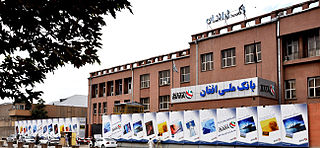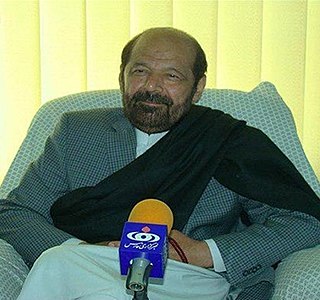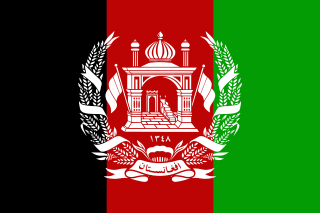This is a list of banks in Afghanistan.

Afghanistan, officially the Islamic Emirate of Afghanistan, is a landlocked country located at the crossroads of Central and South Asia. Referred to as the Heart of Asia, it is bordered by Pakistan to the east and south, Iran to the west, Turkmenistan to the northwest, Uzbekistan to the north, Tajikistan to the northeast, and China to the northeast and east. Occupying 652,864 square kilometers (252,072 sq mi) of land, the country is predominately mountainous with plains in the north and the southwest, which are separated by the Hindu Kush mountain range. As of 2021, its population is 40.2 million, composed mostly of ethnic Pashtuns, Tajiks, Hazaras, and Uzbeks. Kabul is the country's largest city and serves as its capital.

Kabul is the capital and largest city of Afghanistan, located in the eastern section of the country. It is also a municipality, forming part of the greater Kabul Province, and it is divided into 22 districts. According to estimates in 2021, the population of Kabul was 4.6 million and it serves as Afghanistan's political, cultural and economical center. Rapid urbanization has made Kabul the world's 75th largest city.

Kabul, situated in the east of the country, is one of the thirty-four provinces of Afghanistan. The capital of the province is Kabul city, which is also Afghanistan's capital and largest city. The population of the Kabul Province is over 5 million people as of 2020, of which over 85 percent live in urban areas. The current governor of the province is Qari Baryal.
Kam Air is the largest private Afghan airline. Founded in 2003, Kam Air has seven aircraft and a workforce of over 1,200 people, operating scheduled domestic passenger services throughout Afghanistan and international services to destinations in Central Asia, South Asia, and the Middle East. Its hub is at Kabul International Airport in the capital Kabul. Due to the collapse of the Islamic Republic of Afghanistan, all civilian services in the country were temporarily suspended on August 15, 2021. However, domestic flights restarted on September 5, 2021. International flights were also later resumed.

Afghanistan International Bank (AIB) is the largest bank in Afghanistan and the only Afghan bank with international transfer to all countries, with its head office in Kabul. The bank has thirty seven branch offices in the major cities of the country. AIB has international shareholders, two Afghan business groups, one Afghan/American business group. It opened in 2004.
Azizi Bank is one of the largest commercial banks in Afghanistan. It has 80 branches including extension counters and around 100 ATMs across Afghanistan. The bank opened on June 13, 2006, and is headquartered in Zanbaq Square, Kabul, Afghanistan.
New Kabul Bank is a bank in Afghanistan that has its main branch in the capital city of Kabul. It was established in 2004 as the Kabul Bank, the first private bank in Afghanistan. After corruption and scandals it was re-established in 2011 as the New Kabul Bank.

Bank-e-Millie Afghan (BMA) was the first financial institution in Afghanistan, which opened in 1933 by Herati businessman Abdul Majid Zabuli. It was established as a public-private partnership, with a 72 percent share held by the private sector. BMA was instrumental in introducing formal banking services to the people and government.
Barmal District or Barmal County is a county of Paktika Province, Afghanistan, bordering and South and North Waziristan. Angur Ada is port entry to Paktika Province and a major economic hub. The government office of Barmal County is located in Newa Ada.
The January 2010 Kabul attack was a suicide bombing and gun attack which occurred in central Kabul, Afghanistan for several hours on 18 January 2010. Taliban gunmen attacked the Presidential Palace and several government buildings. Two shopping centres, two cinemas and a bank were also targeted by the attackers. Twelve people were killed in the attack: two civilians, three members of security forces and seven Taliban fighters ; 71 other people were wounded. According to a statement on a Taliban website, the nearby Kabul Serena Hotel and government buildings were the intended target for the attack and that 20 of their members committed the attack.

Sayed Hussein Anwari was a politician in Afghanistan. He was a Shia and came from Mohammed Asef Mohseni's Harakat-e Islami.
Sherkhan Farnood was an Afghan banker, Chairman of Kabul Bank until late 2010, which is Afghanistan's largest private financial institution with over 1 million customers. Farnood held 28.16% of the shares in the Kabul Bank. He also owned Pamir Airways, in partnership with Khalilullah Fruzi/Frozi, Mohammed Fahim and possibly others. According to media reports, by November 2010 Da Afghanistan Bank insisted both Farnood and Kabul Bank chief executive Frozi had been removed from bank management;. As of early 2011 both were effectively under house arrest and could not leave the country.
Capital punishment is a legal punishment in Afghanistan. The methods used hanging and shooting. Stoning, amputation, and flogging were used as method for punishment, especially during the Islamic Emirate of Afghanistan (1996–2001).

Water supply in Afghanistan is managed by the National Water Affairs Regulation Authority (NWARA), which is based in Kabul, Afghanistan. The nation's water supply is characterized by a number of achievements and challenges. Among the achievements are:
2003 in Afghanistan. A list of notable incidents in Afghanistan during 2003

Corruption in Afghanistan is a widespread and growing problem in Afghan society. Transparency International's 2021 Corruption Perceptions Index ranks the country in 174th place out of 180 countries, on a scale where lower-ranked countries are perceived to have a more honest public sector.

On 23 July 2016, a twin bombing occurred in the vicinity of Deh Mazang square in Kabul, capital of Afghanistan, when #Enlightenment_Movement protesters, mostly from the Hazara ethnic minority, were marching against a decision to bypass their region in the development of the TUTAP mega power project. At least 97 people were killed and 260 injured. The terrorist group Islamic State of Iraq and the Levant claimed responsibility, however the same group later on refused it. Some Hazara protestors allege that Afghan president Ashraf Ghani was behind the attack. They believe that Ashraf Ghani government was abetting the terrorists who were responsible for the attack. They also allege that the government officials were preventing the wounded from being shifted to the hospital.
The June 2017 Lashkargah bombing occurred on 22 June 2017, when a suicide attack took place in the New Kabul Bank branch in Lashkargah, capital of Helmand province in Afghanistan. During this attack, at least 34 people were killed and 60 were injured.

Large-scale evacuations of foreign citizens and some vulnerable Afghan citizens took place amid the withdrawal of US and NATO forces during the final days of the war in Afghanistan and the Taliban offensive in Afghanistan in 2021. After the fall of Kabul on 15 August 2021 and the collapse of the Islamic Republic of Afghanistan, Hamid Karzai International Airport remained the only non-Taliban controlled route out of the country, being protected by several thousand NATO troops.